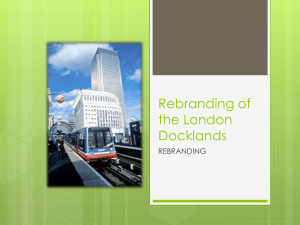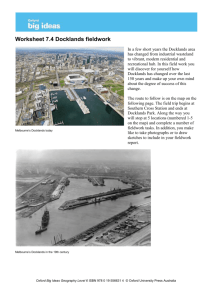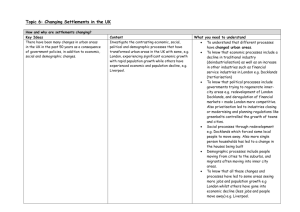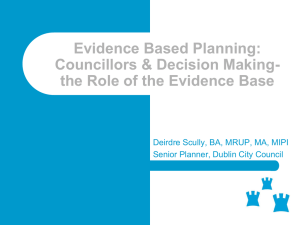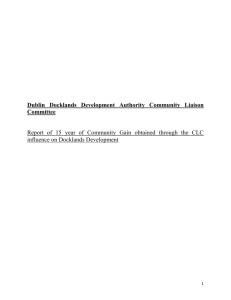Pre-Legislative Scrutiny of the General Scheme of the Dublin
advertisement
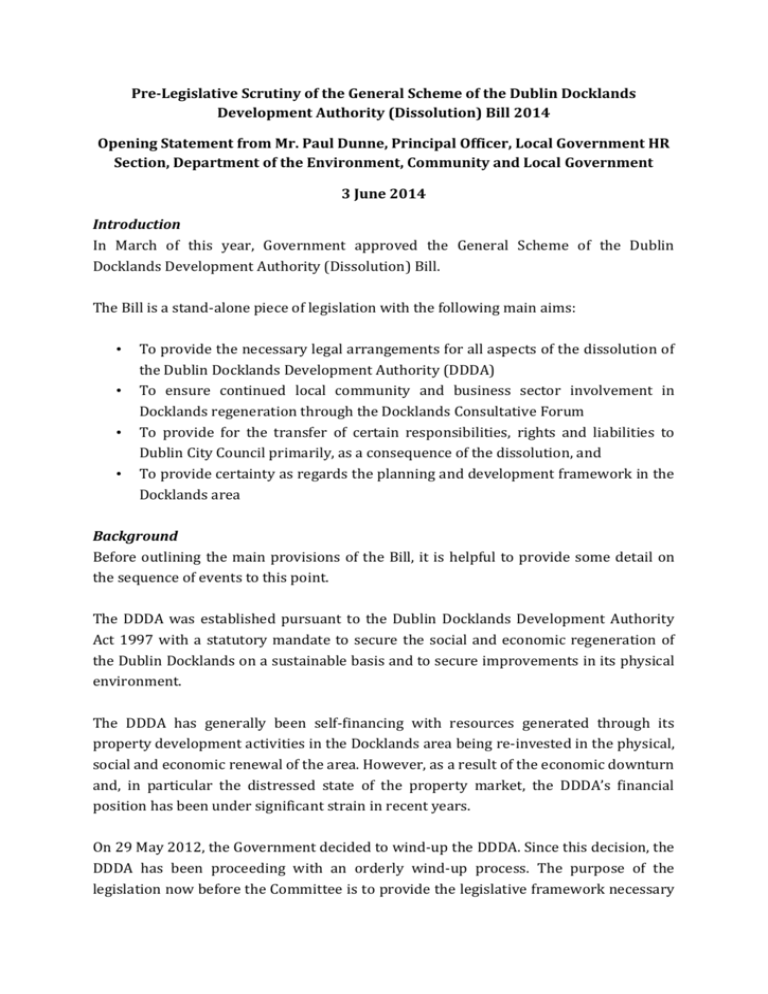
Pre-Legislative Scrutiny of the General Scheme of the Dublin Docklands Development Authority (Dissolution) Bill 2014 Opening Statement from Mr. Paul Dunne, Principal Officer, Local Government HR Section, Department of the Environment, Community and Local Government 3 June 2014 Introduction In March of this year, Government approved the General Scheme of the Dublin Docklands Development Authority (Dissolution) Bill. The Bill is a stand-alone piece of legislation with the following main aims: • • • • To provide the necessary legal arrangements for all aspects of the dissolution of the Dublin Docklands Development Authority (DDDA) To ensure continued local community and business sector involvement in Docklands regeneration through the Docklands Consultative Forum To provide for the transfer of certain responsibilities, rights and liabilities to Dublin City Council primarily, as a consequence of the dissolution, and To provide certainty as regards the planning and development framework in the Docklands area Background Before outlining the main provisions of the Bill, it is helpful to provide some detail on the sequence of events to this point. The DDDA was established pursuant to the Dublin Docklands Development Authority Act 1997 with a statutory mandate to secure the social and economic regeneration of the Dublin Docklands on a sustainable basis and to secure improvements in its physical environment. The DDDA has generally been self-financing with resources generated through its property development activities in the Docklands area being re-invested in the physical, social and economic renewal of the area. However, as a result of the economic downturn and, in particular the distressed state of the property market, the DDDA’s financial position has been under significant strain in recent years. On 29 May 2012, the Government decided to wind-up the DDDA. Since this decision, the DDDA has been proceeding with an orderly wind-up process. The purpose of the legislation now before the Committee is to provide the legislative framework necessary to ensure that all of the legal issues pertaining to the dissolution of the DDDA can be comprehensively dealt with. Main Provisions of the Bill As mentioned earlier, the Bill is a stand-alone piece of legislation. It is important to note that much of the Bill involves provisions of a standard nature associated with the windup of a statutory body, provisions which are similar to those found in other legislation enacted over the years to dissolve other statutory bodies. The Bill has four main aims. Dissolution of DDDA and role of Dublin City Council Firstly, the Bill provides for the dissolution of the DDDA. This requires that certain matters relating to the functions of the DDDA are transitioned appropriately to ensure the continued regeneration of the Docklands area. In this regard, Dublin City Council will be the organisation responsible for leading the social, economic and physical regeneration of the Docklands Area. Docklands Consultative Forum Continuing involvement of the local community and business sector is central to the future success of the Docklands regeneration initiative. The Bill acknowledges this crucial relationship by providing that Dublin City Council will be assisted in their functions by a consultative committee - The Docklands Consultative Forum. This committee will be a committee of the City Council (under section 51 of the Local Government Act 2001) but it will have its own separate statutory underpinning through this Bill, guaranteeing its future role. Treatment of assets and liabilities The Bill provides for the transfer of certain land and property to Dublin City Council. This will include public areas and infrastructure such as bridges, open spaces, footpaths, street lighting etc. The rights and liabilities of the DDDA and matters on-going in relation to contractual issues, litigation etc. will also be transferred to the City Council. At the completion of the wind up process any cash assets remaining will be transferred to such body as the Minister for the Environment, Community and Local Government, with the consent of the Minister for Public Expenditure and Reform, deems appropriate. Planning and Development arrangements Part IV of the Bill deals with planning and development matters in the Docklands to bring certainty to the planning framework in the area. A key priority, outlined by the Minister at the time of the announcement of intent to wind-up the DDDA, is to ensure provision is made for the continued availability of appropriate fast track planning procedures in order to maintain the attractiveness of the Dublin Docklands as a location for investment and to facilitate job creation. At present, in relation to areas for which planning schemes have been made under section 25 of the DDDA Act 1997, the DDDA, as a planning authority, issues certificates authorising development that is consistent with the particular planning scheme (referred to as ‘section 25’ certificates). Such development is deemed to be ‘exempted development’ for the purposes of the Planning and Development Acts and is therefore not subject to the normal planning process. Following the dissolution of the DDDA, the Docklands Strategic Development Zone (SDZ) process will provide the fast-track planning procedure for the future. The SDZ planning scheme was approved by An Bord Pleanála on 16 May 2014. Part IV of the Bill also deals with the legacy issues which have arisen as a consequence of non-commenced and incomplete developments in the Docklands area. The Bill provides for a ‘clean break’ from the existing fast track planning process (operated by the DDDA) to dovetail with the new fast track planning process of the SDZ (to be operated by Dublin City Council). Specifically, the Bill provides that the current procedure whereby the DDDA issues consent for development in the form of section 25 certificates will cease. Also, section 25 certificates which have been issued by the Authority but where substantial works have not been carried out (referred to as ‘non-commenced’ certificates) will cease to be valid. In cases where substantial works have been carried out in accordance with the terms of a section 25 certificate, but the development concerned has not been completed, the holder of that certificate will have a 3 year ‘window’ to complete the development in accordance with the terms of that certificate. A provision is also included which will enable a section 25 certificate holder to apply for a permission to be assessed against the SDZ criteria. If this permission is granted, it will supersede the section 25 certificate. However, it will not affect the legality of anything already build in accordance with the terms of the section 25 certificate, provided it was done so validly. Development of the General Scheme As the detailed drafting of the Bill proceeds, I expect that the proposals will be refined in places, including on foot of further legal advice by the Attorney General’s Office. The Minister will, of course, also consider any views of the Committee arising out of its consideration of the Bill. I expect that drafting of the text of the Bill by the Office of the Parliamentary Counsel will get underway shortly. [Ends].
